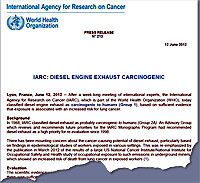GMB Congress Demands HSE Act Over Diesel Causing Cancer To Workers In Confined Spaces
HSE estimates that 652 deaths have resulted from occupational diesel exposure causing lung and bladder cancer and estimates that 100,000 workers are exposed to the hazard
 A call for the Health & Safety Executive (HSE) to take urgent action to prevent deaths in many workplaces due to exposure to diesel fumes was made at GMB Congress today (19th June).
A call for the Health & Safety Executive (HSE) to take urgent action to prevent deaths in many workplaces due to exposure to diesel fumes was made at GMB Congress today (19th June).
This followed the announcement from the International Agency for Research on Cancer (IARC), that Diesel is now listed as a proven human carcinogen. A HSE discussion paper in May 2012 estimates 652 deaths from occupational diesel exposure due to lung and bladder cancer and an estimated 100,000 workers exposed.
GMB’s call is backed by Professor Andrew Watterson and Tommy Gorman of the Occupational and Environmental Health Research Group at the University of Stirling, Scotland. GMB has many thousands of members working as professional drivers and is particularly concerned about the crews of security vehicles which are loaded in security vaults and the many other workers who work with continually in and around diesel fumes.
Brian Terry, GMB Senior Safety Representative from the security industry where workers are exposed to diesel fumes said,
“In the past the HSE has said that diesel fumes might cause cancer. Now they are saying that it does.
GMB members across the UK working in many sectors, now know the dangers of diesel fumes in the workplaces where vehicles are used in confined spaces and the workforce are exposed. GMB calls on the HSE to take immediate, decisive action to safe guard the many workers who will be worried by this report.
The HSE acknowledges that some professional drivers are a high risk group and other workers in construction and tunnelling are also exposed to danger from diesel.
Other high risk groups include railway workers and lorry drivers. These groups must be prioritised by HSE in inspections and for enforcement as it is thought that the biggest risk groups have a 40% increased risk of lung cancer due to diesel exposure.
 Lung cancer from diesel fumes should immediately be added, on the basis of this World Health Organisation IARC assessment to the list of prescribed industrial diseases in the UK.”
Lung cancer from diesel fumes should immediately be added, on the basis of this World Health Organisation IARC assessment to the list of prescribed industrial diseases in the UK.”
The expert panel convened by the International Agency for Research on Cancer (IARC), a United Nations body, announced on 11th June that diesel had been reclassified as a top rated 'Group 1' carcinogen.
Dr Christopher Portier, who led the panel, said:
"The scientific evidence was compelling and the Working Group's conclusion was unanimous, diesel engine exhaust causes lung cancer in humans. Given the additional health impacts from diesel particulates, exposure to this mixture of chemicals should be reduced worldwide."
The panel issued a statement saying:
"The Working Group found that diesel exhaust is a cause of lung cancer (sufficient evidence) and also noted a positive association (limited evidence) with an increased risk of bladder cancer."
As can be expected the industry itself is in denial, running a costly campaign to cast doubt on the evidence, commissioning and publishing a series of reviews of the research and sending representatives to the panel sessions.
A TUC spokesperson commented:
 "This research proves categorically what many unions have claimed for years which is that exposure to diesel exhaust is a significant workplace killer. Unfortunately many employers see diesel exposure as being something they can do nothing about. This is not the case. A lot of the heavy exposure in places like garages and workshops can be easily prevented through ensuring that engines are always turned off when idle, installing proper exhaust ventilation and by scheduling regular preventive maintenance."
"This research proves categorically what many unions have claimed for years which is that exposure to diesel exhaust is a significant workplace killer. Unfortunately many employers see diesel exposure as being something they can do nothing about. This is not the case. A lot of the heavy exposure in places like garages and workshops can be easily prevented through ensuring that engines are always turned off when idle, installing proper exhaust ventilation and by scheduling regular preventive maintenance."
He added:
"We need urgent action from the government and the Health and Safety Executive (HSE) to ensure that measures are taken to reduce the high levels of exposure to these dangerous fumes in our workplaces."
Workers at high risk include fleet maintenance depots professional drivers, miners, construction, tunnelling and railway workers.
You can download the IARC report and Executive Summary from the E-Library Database. Use keyword 'diesel' or select category 'Cancer (work Related)'
Source: GMB / Ivan Timson